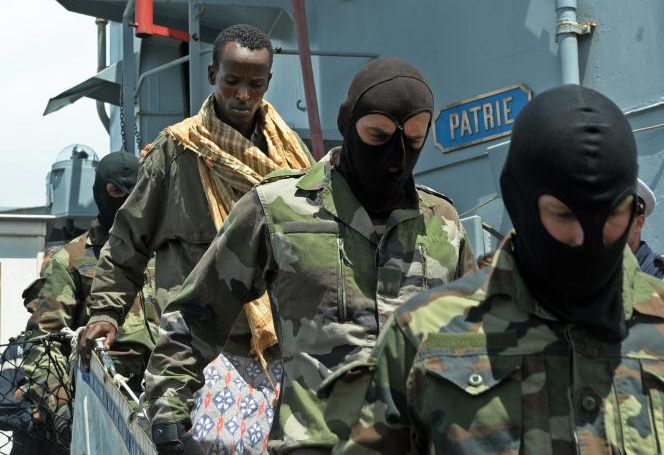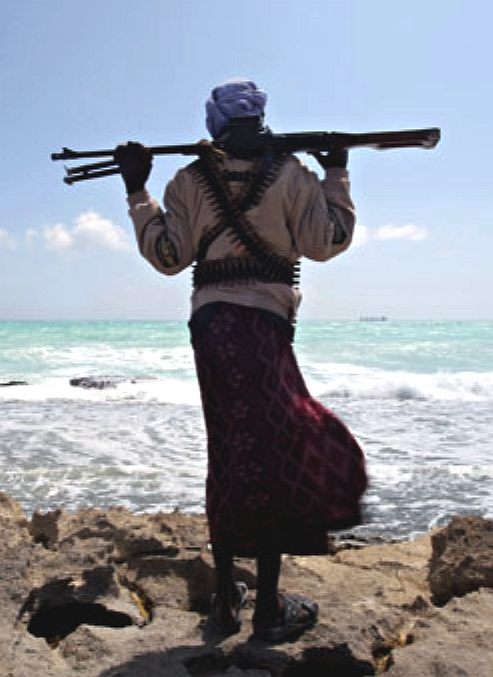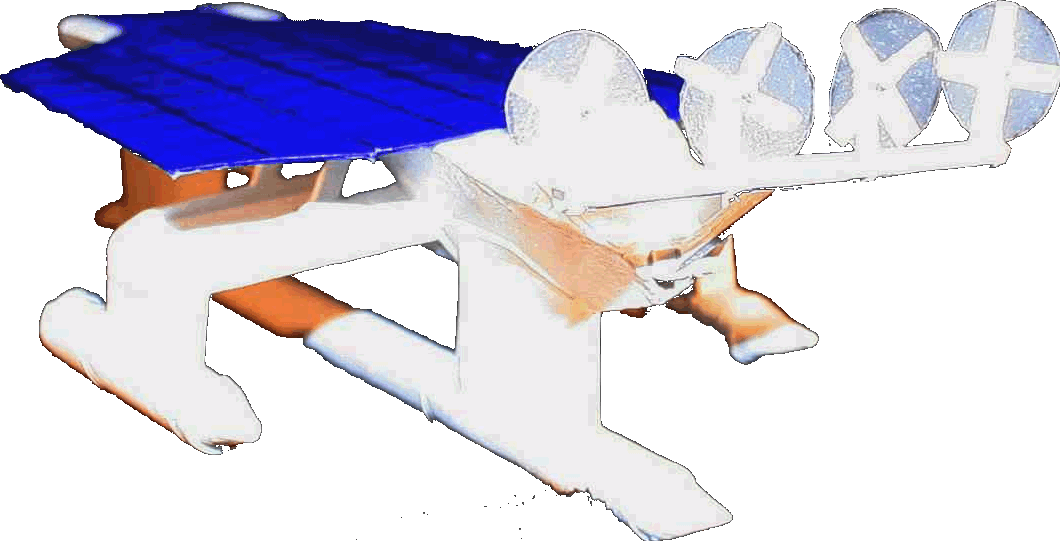|

SOMALI
PIRATE KING 'AFWEYNE' RETIRES - 10 January 2013
Mogadishu - One of Somalia's most notorious pirate leaders who terrorised vast areas of the Indian Ocean, generating multi-million dollar ransoms from the ships he seized, has announced his retirement.
"After being in piracy for eight years, I have decided to renounce and quit, and from today on I will not be involved in this gang activity," Mohamed Abdi Hassan, known as "Afweyne" or "big mouth", told reporters late on Wednesday.
Last year he was described as "one of the most notorious and influential leaders" in Somalia's pirate-hub region of Hobyo, in a report by the UN Monitoring Group on Somalia and Eritrea.
His men were reportedly involved in the 2009 capture of the MV Faina, a Ukrainian transport ship carrying 33 refurbished
Soviet-era T-72 battle tanks, and which was released after a 134-hijack for a reported three million dollars.
He was also reported to be involved in the 2008 capture of the Saudi-owned Sirius Star supertanker, also released for a ransom of several million dollars.
Afweyne did not provide a reason for his change of craft, but speaking at a ceremony in the central Somali region of Adado, he said he has also been working to persuade other pirates to follow his example to quit sea banditry.
"I have also been encouraging many of my colleagues to renounce piracy too, and they have done it," Afweyne said.
Somalia has been ravaged by a relentless conflict since 1991, and a lack of effective central authority has allowed
pirate gangs, extremist militia and other armed groups to control mini-fiefdoms.
However, piracy attacks off the coast of Somalia have plummeted to a three-year low thanks to beefed up naval patrols.

SOMALI
COAST - 9 January 2013
EU Naval Force French Frigate 'Surcouf' and NATO Warship 'USS Halyburton' work together to apprehend twelve pirate suspects.
A merchant vessel sailing 260 miles off the Somali Coast, made a distress call, reporting that she was coming under attack by six men in a fast moving boat, armed with rocket propelled grenades (RPG). Thankfully, having employed avoidance tactics, the merchant vessel was able to escape the attack.
Upon hearing the distress call, NATO warship USS Halyburton, operating as part of NATO’s counter piracy operation – Ocean Shield, and on patrol 80 nautical miles away, launched her helicopter and was able to quickly locate a suspect boat – which was by now towing another vessel, with several men on board.
EU Naval Force (EU Navfor) French Frigate Surcouf, operating as part of the EU’s counter piracy mission – Operation Atalanta, made best speed to the area, as a German EU Navfor Maritime Patrol Aircraft kept watch overhead. Upon arrival, and in full cooperation with the NATO warship, the boarding team from Surcouf boarded the two suspect vessels and apprehended twelve men in total. All twelve men are currently being held on board for evidence collection in order to fully assess the possibility of legal prosecution.
In a recent press conference held on board Surcouf during her port visit to Port Victoria, Seychelles, the Commanding Officer, Commander Hugues Lainé stressed the importance of not lowering the guard towards piracy, as the threat remains, despite the drop in pirate attacks during the past year.
DELHI
DECEMBER 10 2012
S.T.I.C - Shipping New Delhi: An unspecified number of Indian sailors are being held by Somalian pirates and their families have sought help from the government to free them,
parliament was told on Monday.
Defence Minister AK Antony said that while no communication had come from the captive sailors, “requests for (their) release have been received from family members of the hostages”.
He told the Lok Sabha that the government had been provided elaborate anti-piracy measures including naval escorts in the Gulf of Aden to meet the challenge of Somalian
pirates.
India had deployed one warship in the Gulf of Aden since October 2008 and 2,254 merchant ships had been escorted, he said in a written statement.
The minister said the India-Africa Forum had welcomed India’s support to safeguard shipping from piracy. “All concerned countries are cooperating in the efforts to combat piracy.”

MOMABASA
DECEMBER 6 2012
Attacks by Somali pirates have fallen dramatically in 2012, a development chalked up to multi-national
naval efforts, increased security measures by ships, and developments on land in Somalia.
In the Regional Marine Rescue Coordination Centre, overlooking the port in Mombasa, Kenya, officers watch monitors displaying the location of all the ships along the Horn of Africa.
Vessels continuously broadcast signals to the center, but if hijacked by pirates, the signal is cut and they disappear from the screen.
These days, fewer and fewer ships are disappearing. Last year, the European Union Naval Force Somalia, or EU NAVFOR, recorded 176 pirate attacks. In 2012, this number fell to 34 attempted hijackings.
"This year in our region no vessel has been hijacked," said Jonathan Omondi, an operations officer at the center. "The land-based piracy initiatives have made a big contribution, specifically the effect of African Union forces that are deployed on land. Piracy is a land-based problem. Piracy at sea is just a symptom of the problem on land."
While many attribute the decline in piracy to the recent political and military advances made by pro-government forces in Somalia, others emphasize the coordinated efforts of
NATO and EU naval forces patrolling the Somali coast.
Peter McGhie, the chief officer in Mombasa for the United Nations Support Office for AMISOM, says the use of private security on ships has also deterred the pirates.
"We’re putting vessel protection details on all of our vessels and the end result is that the graph has gone right down," he said.
While pirate attacks have been reduced, grapples over jurisdiction linger. Not far from the port in Mombasa, many accused pirates remain in custody at the Shimo la Tewa Prison.
Jay Bahadur, author of the book "The Pirates of Somalia," says the legal situation is complicated. Two treaties - the U.N. Convention on the Law of the Sea and the Convention for Suppression of Unlawful Acts Against Maritime Navigation - outline maritime law.
"In essence it makes piracy a crime of international jurisdiction. If it’s outside of territorial waters, 12 nautical miles, it means anyone who captures a group of pirates has jurisdiction over them," he said.
Last week, a court in the U.S. state of Virginia denied a request of suspected Somali
pirates to change the location of their trial. They are accused of killing four Americans while pirating a yacht in 2011.
Bahadur says this case in unusual. Despite having legal claim, most Western countries avoid extradition of captured pirates.
"Up until a year-and-a-half ago, Kenya was the main dumping ground for pirates, but it’s really stretching the international conventions to allow that," he said.
In 2010, Kenya, its prisons overcrowded, ended an agreement with the EU to try suspected
Somali pirates.
Since then the Seychelles islands have headed the prosecution efforts. This week the country sent 17 convicted Somali pirates to serve their sentences in jails in Somalia's Puntland region and the breakaway republic of Somaliland.

LINKS
http://www.firstpost.com/politics/families-of-indian-sailor-held-by-somali-pirates-seek-govt-help-552258.html
http://www.voanews.com/content/somalia-pirate-attacks-plummet-in-2012/1559967.html
Maritime
Propulsion News somali pirates use rpg to attack ship 12 arrested
News
24. News Mogadishu Somali pirate king pin Afweyne retires

Solarnavigator
is designed to carry the Scorpion
anti pirate weapon. A fleet of such autonomous vessels could be the basis
of an international peacekeeping, and/or emergency rescue force.
+
44 (0) 1323 831727 +44 (0) 7842 607865
Max
Energy Limited & Blueplanet Productions
Solar House, BN27 1RF, United Kingdom

Somali pirates
attack an unusual boat under orders from Columbian warlords. The mission
is to capture the DNA database onboard - but the pirates are in for a
surprise.
|




